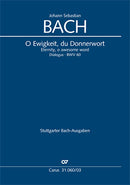| 作曲者 | Johann Sebastian Bach (1685-1750)・ヨハン・セバスティアン・バッハ |
| タイトル | O Ewigkeit, du Donnerwort, BWV 60(ヴォーカル・スコア) |
| 出版社 | Carus・カールス |
| 楽器編成(詳細) | Soli ATB,Coro SATB,2 Obda,Cor,2 Violins,Viola,Basso continuo |
| 品番 | M007043384 |
| 校訂者 | Reinhold Kubik |
| 編曲者 | Paul Horn |
| 難易度 | 中級 |
| 言語 | ドイツ語・英語 |
| 形状 | 36 ページ・19 x 27 cm・112 g・ソフトカバー |
| 演奏時間 | 20分 |
| 作曲年 | 1723年 |
| 出版年 | 1991年 |
| 出版番号 | CV 31.060/03 |
| ISMN | 979-0-007-04338-4 |
| サンプル | https://www.carusmedia.com/images-intern/medien/30/3106003/3106003x.pdf |
The cantata "Eternity, O awesome word" BWV 60, which belongs to Bach’s first Leipzig annual cycle and was written for the 24th Sunday after Trinity Sunday, is one of Bach’s few dialog cantatas. It deals with the conflict between Dread (contralto) and Hope (tenor) in the face of death, which is already the topic of the expansive opening chorale arrangement . Using a device which was surprisingly dramatic for a Baroque church cantata, the bass joins in as a third vocal part (functioning as Vox Christi) in the penultimate movement – the recitative “Der Tod bleibt doch der menschlichen Natur verhasst” (Dread) – with the Bible quote “Blessed are the dead which die in the Lord.” This also convinces Dread and leads into the concluding chorale “Es ist genug, so nimm Herr meinen Geist.”



